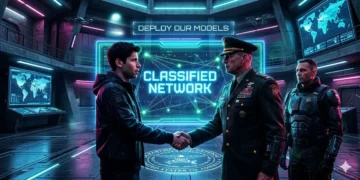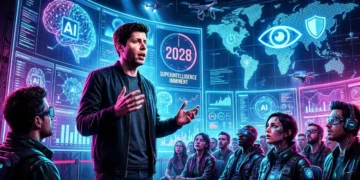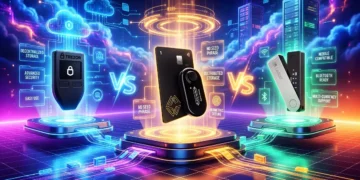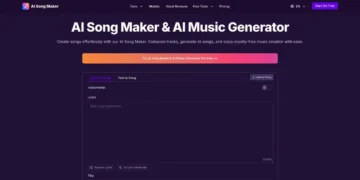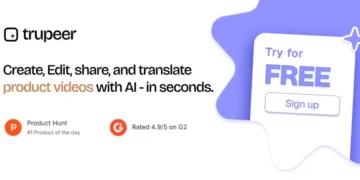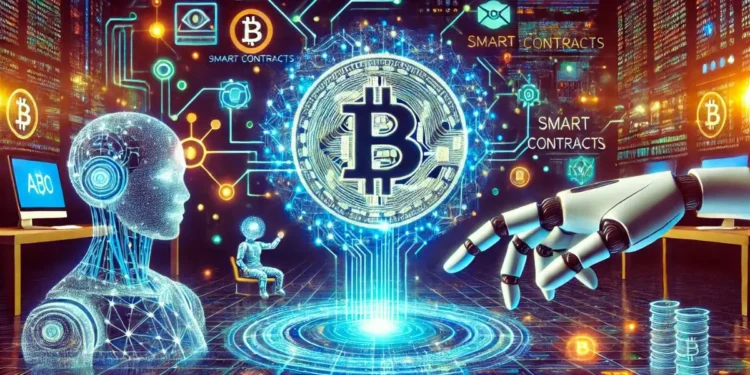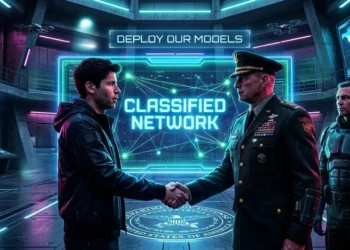In recent years, artificial intelligence (AI) has revolutionized multiple industries, from healthcare to finance, and its influence is rapidly growing within blockchain technology. One area where AI is making a significant impact is optimizing smart contracts for Bitcoin developers. While Bitcoin’s primary function has always been to serve as a decentralized digital currency, its underlying blockchain has the potential for much more, especially with the development of smart contracts.
Smart contracts are self-executing contracts with the terms of the agreement written directly into lines of code. These contracts automatically enforce and execute themselves when predefined conditions are met. Bitcoin developers are increasingly looking at integrating smart contracts more seamlessly into the Bitcoin network, enhancing its utility beyond just financial transactions. In this context, AI is becoming a vital tool in optimizing smart contracts for efficiency, security, and scalability.
In this article, we will explore how AI is helping Bitcoin developers optimize smart contracts, why this collaboration matters, and what the future holds for these technologies working together.
1. What are Smart Contracts in Bitcoin?
Smart contracts were initially popularized by Ethereum, where they serve as the backbone of decentralized applications (dApps). However, Bitcoin can also run smart contracts, albeit with certain limitations compared to platforms like Ethereum. Bitcoin’s scripting language is more conservative, focusing on security and stability rather than complex functionalities.
That said, with innovations like the Taproot upgrade, which enhances Bitcoin’s privacy and scalability, the potential for more advanced smart contracts on Bitcoin is growing. Bitcoin developers are now looking at ways to make smart contracts on the Bitcoin blockchain more efficient, and that’s where AI steps in.
2. How AI is enhancing Smart Contract optimization
a. Code analysis and bug Detection
One of the most valuable ways AI helps Bitcoin developers is through advanced code analysis. Writing secure smart contracts can be incredibly challenging. A single vulnerability in the code can lead to catastrophic losses, as we’ve seen in various high-profile hacks in the cryptocurrency space.
AI-driven tools can analyze the code in smart contracts, identifying potential bugs and vulnerabilities faster and more accurately than human developers can. Machine learning models can be trained to recognize patterns in code that are prone to failure or exploitation. By automatically flagging these issues during the development phase, AI reduces the risk of deploying faulty contracts, ultimately enhancing security on the Bitcoin blockchain.
AI’s ability to learn from past failures is also crucial. As it processes more data and past incidents, it becomes better at predicting where future vulnerabilities might lie, thus improving the overall robustness of smart contracts on the Bitcoin network.
b. Optimizing Contract efficiency
Efficiency is a crucial consideration when developing smart contracts, especially on a blockchain like Bitcoin where transaction fees and block size limitations play significant roles. A bloated or inefficient smart contract can increase the cost of execution, which can be a deterrent for users.
AI tools are being employed to optimize the performance of these contracts by streamlining the code and removing unnecessary or redundant lines. By doing this, AI helps developers reduce the amount of computing power required to execute a smart contract, making the entire process more cost-effective and faster.
Machine learning algorithms can evaluate multiple versions of a smart contract and suggest optimizations that minimize resource consumption while maintaining the integrity and function of the contract. This optimization allows for more complex smart contracts to run efficiently on the Bitcoin blockchain, making them more practical for real-world use cases.
c. Automating Contract audits
Auditing a smart contract is a necessary step before deploying it on the blockchain. Traditionally, this process is time-consuming and requires highly specialized knowledge. However, AI can speed up this process by automating many aspects of smart contract audits.
AI-based auditing tools can run simulations to test the smart contract under different scenarios, identifying edge cases that might cause the contract to fail. These simulations can help predict how the contract will behave in various market conditions or stress tests, ensuring the contract operates as intended in the real world.
By automating large parts of the auditing process, AI not only saves developers time but also increases the thoroughness of the audit. This is essential in an industry where even the smallest oversight can lead to huge financial losses.
3. AI and Bitcoin Smart Contracts: The importance of security
Security is one of the most critical aspects of smart contracts. Since they operate on an immutable blockchain, once a contract is deployed, it cannot be altered. This makes identifying and fixing vulnerabilities before deployment crucial.
AI enhances the security of smart contracts through real-time monitoring and anomaly detection. After a smart contract is deployed, AI systems can continuously monitor its performance and look for unusual patterns or behaviors that may indicate a security breach or exploitation attempt. If something suspicious is detected, AI can alert developers to intervene quickly, reducing the chances of an exploit.
For instance, AI could detect irregular transaction volumes, unusual contract interactions, or even subtle changes in user behavior that could suggest an attack is imminent. By providing this level of security, AI helps Bitcoin developers create safer, more resilient smart contracts.
4. AI’s Role in Scalability solutions for Bitcoin
Scalability has always been a concern for Bitcoin. The more transactions or contracts that need to be processed, the more pressure is placed on the network. Smart contracts exacerbate this issue because they require computational power to execute.
AI is playing a crucial role in developing scalability solutions for smart contracts on Bitcoin. By optimizing how contracts are written and executed, AI can help reduce the computational load. Furthermore, AI algorithms can predict network congestion and adjust contract execution times to avoid peak periods, thereby improving overall network efficiency.
In the long run, AI might even assist in off-chain solutions or Layer 2 technologies, such as the Lightning Network, to facilitate more complex smart contract interactions without clogging the main Bitcoin blockchain. These off-chain solutions could provide a much-needed boost in scalability while maintaining the decentralization and security that Bitcoin is known for.
5. The future of AI and Bitcoin Smart Contracts
The synergy between AI and blockchain technology is still in its early stages, but the potential is immense. As AI continues to evolve, its applications for Bitcoin smart contracts will likely become more sophisticated.
One exciting possibility is the development of autonomous smart contracts, where AI can create, manage, and optimize contracts without human intervention. These contracts could adapt to changing market conditions, legal frameworks, or user preferences, providing a more dynamic and flexible solution for businesses and individuals using the Bitcoin blockchain.
Additionally, AI could play a crucial role in making smart contracts more accessible to non-developers. By simplifying the process of creating and deploying smart contracts, AI tools could democratize access to this powerful technology, allowing anyone to take advantage of decentralized agreements without needing to understand the complexities of blockchain development.
Key ways AI is helping optimize Bitcoin smart contracts:
- Vulnerability Detection:AI can analyze smart contract code to identify potential security flaws and vulnerabilities, allowing developers to proactively fix them before deployment.
- Static Code Analysis:Machine learning algorithms can scan smart contract code for patterns that might indicate vulnerabilities, such as insecure function calls or improper input validation.
- Automated Code Generation:AI can generate basic smart contract structures based on predefined templates and parameters, streamlining the development process.
- Data-Driven Optimization:By analyzing historical transaction data and market trends, AI can suggest improvements to smart contract logic to optimize execution efficiency.
- Anomaly Detection:AI can monitor smart contract activity for unusual patterns that could signify malicious behavior or fraudulent activity.
- Natural Language Processing (NLP):
NLP can translate legal documents into smart contract code, reducing the need for manual coding and ensuring accuracy.
Important considerations:
- Limited Functionality of Bitcoin:While Bitcoin supports basic smart contracts through its scripting language, the capabilities are not as extensive as on other blockchain platforms, limiting the full potential of AI optimization.
- Security Concerns:Developers must carefully evaluate the reliability of AI-generated code and ensure that AI tools are not introducing new vulnerabilities.
Key Insights into AI’s Role in Bitcoin Smart Contracts
AI’s integration with blockchain technology is more than just a trend—it’s a game-changer. Here are some powerful statistics and insights that highlight its impact:
- Increased Speed: AI-driven optimizations have been shown to reduce smart contract deployment time by up to 40%.
- Improved Security: According to blockchain security firms, AI-based contract audits have identified up to 25% more vulnerabilities than traditional methods.
- Cost Reduction: AI’s efficiency in optimizing code can reduce transaction costs by as much as 30%, making Bitcoin more scalable for mass adoption.
As AI continues to evolve, its ability to improve smart contracts will only grow, allowing for greater automation, security, and cost savings. These developments are crucial for Bitcoin developers as they work to create more sophisticated financial applications on the blockchain.
The Impact of AI on Smart Contract performance and efficiency
Artificial intelligence (AI) is transforming many sectors, and blockchain technology is no exception. One of the most significant innovations in blockchain is smart contracts—self-executing contracts that automate and enforce agreements based on predetermined conditions. AI’s integration into smart contract development has the potential to revolutionize how these contracts operate, improving performance and efficiency. In this section, we’ll explore how AI is influencing smart contract functionality.
What are the important AI technologies for Smart Contracts?
To fully understand how AI optimizes smart contracts, it’s essential to know which AI technologies play the biggest role. These technologies help streamline development, improve security, and increase the overall effectiveness of blockchain-based contracts.
Machine Learning
Machine learning (ML) is a subset of AI that allows systems to learn from data and improve over time without being explicitly programmed. In the context of smart contracts, ML models can detect patterns and predict future vulnerabilities or inefficiencies in the contract code. This predictive capability is invaluable for Bitcoin developers aiming to create more secure and optimized smart contracts, as it helps prevent potential flaws before they become critical.
Natural Language Processing
Natural Language Processing (NLP) focuses on the interaction between computers and human language. NLP can be used in smart contract development to simplify the creation process, allowing developers to write smart contracts in a more human-readable format. This helps bridge the gap between legal experts and developers, ensuring that the contracts align with real-world legal terminology and conditions while being executable on the blockchain.
Robotic Process Automation
Robotic Process Automation (RPA) automates repetitive tasks that are usually done by humans. In smart contract development, RPA can handle routine code reviews, optimize contract performance, and monitor contract execution. This automation frees up developers’ time to focus on more complex tasks, while ensuring that the smart contracts remain efficient and secure throughout their lifecycle.
How Does AI Help in improving Smart Contract development?
AI plays a crucial role in improving multiple facets of smart contract development, from enhancing efficiency to ensuring greater accuracy in contract execution. Let’s dive deeper into the various ways AI is making a difference.
Better Efficiency
AI tools help streamline the smart contract creation process by automatically analyzing and optimizing code. Machine learning algorithms can identify redundant code or inefficiencies that human developers might overlook, resulting in contracts that require less computational power and lower transaction costs. This increased efficiency makes smart contracts more practical and scalable for everyday use on platforms like Bitcoin.
Improved Security
Security is paramount in smart contracts because of the irreversible nature of blockchain transactions. AI enhances security by providing real-time code analysis, identifying vulnerabilities, and detecting potential attacks before they occur. Through continuous monitoring and AI-driven audits, smart contracts can be better protected against malicious activities, making the Bitcoin blockchain more secure for users and developers alike.
The Power of Data Analytics
AI’s ability to analyze vast amounts of data allows it to identify trends and insights that can improve smart contract performance. For instance, AI can predict network congestion and optimize the timing of contract executions, ensuring that they run efficiently even during high-traffic periods. By leveraging data analytics, Bitcoin developers can create more reliable and scalable smart contracts.
Enhancements in Accuracy
Accuracy is essential when executing smart contracts since even a minor error can have significant consequences. AI’s ability to learn from past data and continuously improve its models ensures that contracts are executed precisely as intended. AI-driven systems can also test smart contracts under various scenarios to ensure they operate correctly across different conditions, further improving accuracy.
Real-time Monitoring and Improvements in Compliance
AI can monitor smart contract execution in real time, allowing for quick identification and resolution of any anomalies. Additionally, AI helps ensure that smart contracts comply with legal standards and industry regulations, reducing the risk of legal disputes or non-compliance. This is especially important as regulatory frameworks around blockchain and cryptocurrencies continue to evolve.
How can you use AI Tools for Smart Contract development?
AI tools are becoming more accessible and sophisticated, making them invaluable resources for smart contract developers. From automated auditing tools to machine learning models that optimize code, these AI-powered solutions can significantly reduce development time while improving contract quality. Developers can also use AI-driven platforms to simulate various contract outcomes, ensuring that the smart contracts perform as expected under different conditions.
Challenges of implementing AI for Smart Contract development
While AI offers numerous benefits for smart contract optimization, integrating these technologies comes with its own set of challenges. These obstacles must be addressed to ensure that AI-driven smart contracts can function securely and effectively.
Security Vulnerabilities
Although AI enhances security, it can also introduce new vulnerabilities, particularly if the algorithms used are not well-understood by the developers. Relying on AI for critical tasks without fully grasping how it makes decisions can lead to blind spots in security, increasing the risk of exploitation.
Transparency and Interpretation of Algorithms
AI systems, especially those powered by machine learning, often operate as “black boxes,” where the decision-making process is not entirely transparent. This lack of transparency can make it difficult for developers and auditors to fully understand how a smart contract functions, potentially leading to issues with trust and accountability.
Legal and Ethical Implications
As AI plays a larger role in the automation of legal agreements via smart contracts, it raises questions about accountability. Who is responsible if an AI-powered contract fails or acts unexpectedly? These legal and ethical concerns must be addressed, especially as smart contracts become more integrated into everyday business operations.
Quality and Reliability of Data
AI relies heavily on the quality of data it processes. Poor data quality can lead to inaccurate predictions or faulty contract optimization, undermining the reliability of the smart contract. Ensuring the integrity and accuracy of the data-feeding AI models is critical to ensuring that smart contracts operate as intended.
Conclusion
The intersection of AI and Bitcoin smart contracts represents a new frontier for blockchain technology. By leveraging AI’s capabilities, developers can create more secure, efficient, and scalable smart contracts, paving the way for broader adoption of decentralized finance (DeFi) on Bitcoin.
AI-driven optimization allows Bitcoin developers to focus on innovation while minimizing risks associated with coding errors or security vulnerabilities. As AI continues to advance, we can expect even more significant improvements in how Bitcoin smart contracts are created and managed.
Ultimately, AI is enabling Bitcoin to expand its use cases and further cement its role in the evolving world of blockchain technology. Whether you’re a developer or an investor, understanding how AI is transforming smart contracts can give you a competitive edge in the crypto space.
FAQs
1. What are Smart Contracts in Bitcoin?
Smart contracts are self-executing contracts with the terms directly written into code. They enable trustless transactions and processes on the blockchain, eliminating intermediaries and enhancing transparency. While smart contracts are more commonly associated with Ethereum, Bitcoin developers have been working on incorporating advanced smart contracts using layers like the Lightning Network and other innovative solutions.
2. How Is AI Improving the Development of Smart Contracts?
AI is playing a crucial role in optimizing Bitcoin’s smart contracts by:
- Enhancing Security: One of the biggest challenges in smart contract development is ensuring that contracts are secure. AI helps detect vulnerabilities and weaknesses in the code faster than manual checks, thus reducing the risk of exploits. This is especially important in a space where millions of dollars can be lost due to a single coding flaw.
- Automating Audits: Auditing smart contracts is a complex and resource-intensive process. AI algorithms can automate these audits, detecting bugs and vulnerabilities more efficiently. This not only speeds up the development process but also improves the overall quality of smart contracts.
- Predictive Analytics: AI can predict potential issues before they arise by analyzing previous smart contract failures and using this data to forecast future problems. This proactive approach to error detection can save Bitcoin developers significant time and resources.
3. Can AI Help Make Smart Contracts More Efficient?
Yes, AI is driving efficiency in several ways:
- Optimized Code: AI tools help developers write cleaner, more efficient code, reducing the size and complexity of smart contracts. This optimization leads to faster execution times and lower transaction costs, crucial for Bitcoin’s scalability.
- Resource Allocation: AI can analyze past transactions and blockchain activity to suggest the most efficient way to structure and deploy smart contracts. By optimizing resource usage, developers can create contracts that execute more quickly and at lower fees.
4. What Role Does AI Play in Enhancing Security for Smart Contracts?
Security is one of the top concerns for developers working with smart contracts. AI addresses this by:
- Identifying Vulnerabilities: Machine learning models trained on historical data can identify patterns associated with contract vulnerabilities, such as reentrancy attacks or integer overflows. AI can detect anomalies in the code and flag potential risks before contracts are deployed.
- Real-Time Monitoring: Once deployed, AI can monitor smart contracts for unusual activities or behavior, offering real-time insights that allow developers to respond to threats swiftly. This continuous surveillance helps prevent costly exploits and fraud.
5. How Can AI Assist Bitcoin Developers with Legal and Compliance Challenges?
Smart contracts operate within the confines of legal frameworks, which can be a challenge due to the decentralized nature of blockchain. AI helps in the following ways:
- Regulatory Compliance: AI can help developers ensure that their smart contracts adhere to local and international regulations. By analyzing legal documents and compliance guidelines, AI provides insights on how to design contracts that meet legal standards.
- Dispute Resolution: AI-powered dispute resolution systems can be integrated into smart contracts. These systems can quickly and efficiently resolve contract disputes, offering a fair and transparent solution based on the contract’s terms and conditions.
How is AI helping Bitcoin developers optimize smart contracts?
AI helps optimize smart contracts by identifying bugs, improving code efficiency, automating audits, and enhancing security through real-time monitoring.
Why is security important for smart contracts?
Security is critical because smart contracts are immutable once deployed, meaning any vulnerability could lead to financial losses. AI enhances security by identifying vulnerabilities before deployment and monitoring for anomalies post-launch.
What role does AI play in Bitcoin scalability?
AI helps reduce computational load and optimize contract execution times, which are essential for improving Bitcoin’s scalability. AI can also assist in off-chain solutions like the Lightning Network.
Can AI make smart contracts more accessible?
Yes, AI can simplify the creation and deployment of smart contracts, making them more accessible to non-developers by automating complexprocesses.
Disclaimer: This post may contain affiliate links. This means I may earn a small commission if you purchase something through my links, at no additional cost to you. Please know that I only recommend products and services that I use and believe in. I appreciate your support!
Twitter Linkedin Facebook Telegram Instagram Google News Amazon Store
